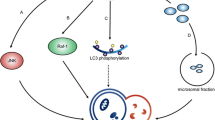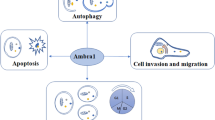Abstract
Background
The autophagy pathway is used by eukaryotic cells to maintain metabolic homeostasis. Autophagy has two functions in cancerous cells which could inhibit tumorigenesis or lead to cancer progression by increasing cell survival and proliferation.
Methods and results
In this review article, Web of Science, PubMed, Scopus, and Google Scholar were searched and summarized published studies to explore the relationship between DAPK1 and mTORC1 signaling association on autophagy in cancer. Autophagy is managed through various proteins including the mTOR, which is two separated structural and functional complexes known as mTORC1 and mTORC2. MTORC1 is an important component of the regulatory pathway affecting numerous cellular functions including proliferation, migration, invasion, and survival. This protein plays a key role in human cancers. The activity level of mTORC1 is regulated by the death-associated protein kinases (DAPks) family, especially DAPK1. In many cancers, DAPK1 acts as a tumor suppressor which can be attributed to its ability to suppress cellular transformation and to inhibit metastasis.
Conclusions
A deep investigation not only will reveal more about the function of DAPK1 but also might provide insights into novel therapies aimed to modulate the autophagy pathway in cancer and to achieve better cancer therapy.

Similar content being viewed by others
References
Yang Z, Klionsky DJ (2010) Eaten alive: a history of macroautophagy. Nat Cell Biol 12(9):814–822
Glick D et al (2010) Orthomolecular medicine. J Pathol 221(1):3–12
Boya P et al (2013) Emerging regulation and functions of autophagy. Nat Cell Biol 15(7):713–720
Yamada D et al (2019) Inhibition of the glutamine transporter SNAT1 confers neuroprotection in mice by modulating the mTOR-autophagy system. Commun Biol 2(1):1–11
Levine B (2005) Eating oneself and uninvited guests: autophagy-related pathways in cellular defense. Cell 120(2):159–162
Shiloh R et al (2018) Non-canonical activation of DAPK2 by AMPK constitutes a new pathway linking metabolic stress to autophagy. Nat Commun 9(1):1–15
Nazio F et al (2013) mTOR inhibits autophagy by controlling ULK1 ubiquitylation, self-association and function through AMBRA1 and TRAF6. Nat Cell Biol 15(4):406–416
Thorburn A et al (2014) Autophagy and cancer therapy. Mol Pharmacol 85(6):830–838
Ahmadi S et al (2019) Dysregulation of miR-638 in breast cancer patients and bioinformatics investigation of its target genes in apoptosis, angiogenesis and autophagy pathways. Int J Cancer Manag. https://doi.org/10.5812/ijcm.88829
Sabatini DM (2006) mTOR and cancer: insights into a complex relationship. Nat Rev Cancer 6(9):729–734
Easton J, Houghton P (2006) mTOR and cancer therapy. Oncogene 25(48):6436–6446
Nair S et al (2013) Death associated protein kinases: molecular structure and brain injury. Int J Mol Sci 14(7):13858–13872
Farag AK, Roh EJ (2019) Death-associated protein kinase (DAPK) family modulators: current and future therapeutic outcomes. Med Res Rev 39(1):349–385
Temmerman K et al (2013) Structural and functional diversity in the activity and regulation of DAPK-related protein kinases. FEBS J 280(21):5533–5550
Martina JA et al (2012) MTORC1 functions as a transcriptional regulator of autophagy by preventing nuclear transport of TFEB. Autophagy 8(6):903–914
Memmott RM, Dennis PA (2009) Akt-dependent and-independent mechanisms of mTOR regulation in cancer. Cell Signal 21(5):656–664
Soliman GA et al (2010) mTOR Ser-2481 autophosphorylation monitors mTORC-specific catalytic activity and clarifies rapamycin mechanism of action. J Biol Chem 285(11):7866–7879
Dai H, Thomson AW (2019) The “other” mTOR complex: new insights into mTORC 2 immunobiology and their implications. Am J Transplant 19(6):1614–1621
Guertin DA, Sabatini DM (2007) Defining the role of mTOR in cancer. Cancer Cell 12(1):9–22
Pryor WM et al (2014) Huntingtin promotes mTORC1 signaling in the pathogenesis of Huntington’s disease. Sci Signal 7(349):ra103
Efeyan A et al (2012) Amino acids and mTORC1: from lysosomes to disease. Trends Mol Med 18(9):524–533
Al-Bari MAA, Xu P (2020) Molecular regulation of autophagy machinery by mTOR-dependent and-independent pathways. Ann N Y Acad Sci 1467(1):3–20
Dossou AS, Basu A (2019) The emerging roles of mTORC1 in macromanaging autophagy. Cancers 11(10):1422
Jung CH et al (2010) mTOR regulation of autophagy. FEBS Lett 584(7):1287–1295
Rabanal-Ruiz Y, Korolchuk VI (2018) mTORC1 and nutrient homeostasis: the central role of the lysosome. Int J Mol Sci 19(3):818
Shiloh R, Kimchi A (2018) AMPK activates DAPK2 to promote autophagy. Oncotarget 9(60):31570
Wan W, Liu W (2019) MTORC1 regulates autophagic membrane growth by targeting WIPI2. Autophagy 15(4):742–743
Son SM et al (2020) Leucine regulates autophagy via acetylation of the mTORC1 component raptor. Nat Commun 11(1):1–13
Settembre C (2019) Transcriptional regulation of autophagy: mechanisms and diseases. Front Cell Dev Biol 7:114
Wei Z et al (2019) DAPK1 (death associated protein kinase 1) mediates mTORC1 activation and antiviral activities in CD8+ T cells. Cell Mol Immunol 18:1–12
Xu L-Z et al (2019) DAPK1: a novel pathology and treatment target for Alzheimer’s disease. Mol Neurobiol 56(4):2838–2844
Singh P et al (2016) Death associated protein kinase 1 (DAPK1): a regulator of apoptosis and autophagy. Front Mol Neurosci 9:46–46
Alsaadi MS (2019) Role of DAPK1 in neuronal cell death, survival and diseases in the nervous system. Int J Dev Neurosci 74:11–17
Chen D et al (2019) Death-associated protein kinase 1 as a promising drug target in cancer and Alzheimer’s disease. Recent Pat Anti-Cancer Drug Discov 14(2):144–157
Guertin DA, Sabatini DM (2005) An expanding role for mTOR in cancer. Trends Mol Med 11(8):353–361
Yuan W et al (2017) Correlation of DAPK1 methylation and the risk of gastrointestinal cancer: a systematic review and meta-analysis. PLoS ONE 12(9):e0184959
Xiang H et al (2020) Targeting autophagy-related protein kinases for potential therapeutic purpose. Acta Pharm Sin B 10(4):569–581
Shiloh R et al (2019) Ser289 phosphorylation activates both DAPK1 and DAPK2 but in response to different intracellular signaling pathways. Cell Cycle 18(11):1169–1176
Lin Y et al (2011) Tuberous sclerosis-2 (TSC2) regulates the stability of death-associated protein kinase-1 (DAPK) through a lysosome-dependent degradation pathway. FEBS J 278(2):354–370
Cohen O, Kimchi A (2001) DAP-kinase: from functional gene cloning to establishment of its role in apoptosis and cancer. Cell Death Differ 8(1):6–15
Calmon MF et al (2007) Methylation profile of genes CDKN2A (p14 and p16), DAPK1, CDH1, and ADAM23 in head and neck cancer. Cancer Genet Cytogenet 173(1):31–37
Gade P et al (2009) Down-regulation of the transcriptional mediator subunit Med1 contributes to the loss of expression of metastasis-associated dapk1 in human cancers and cancer cells. Int J Cancer 125(7):1566–1574
Kim LC et al (2017) mTORC1 and mTORC2 in cancer and the tumor microenvironment. Oncogene 36(16):2191–2201
Lin Y et al (2010) Death-associated protein kinase (DAPK) and signal transduction: additional roles beyond cell death. FEBS J 277(1):48–57
Carracedo A et al (2008) Inhibition of mTORC1 leads to MAPK pathway activation through a PI3K-dependent feedback loop in human cancer. J Clin Investig 118(9):3065–3074
Elbadawy M, Usui T, Yamawaki H, Sasaki K (2018) Novel functions of death-associated protein kinases through mitogen-activated protein kinase-related signals. Int J Mol Sci 19(10):3031. https://doi.org/10.3390/ijms19103031
Author information
Authors and Affiliations
Contributions
PM: conception & design of study and writing the manuscript, MS and AS: review & editing and writing the manuscript, ZA and FK: writing the manuscript, HT: supervision and validation.
Corresponding author
Ethics declarations
Conflict of interest
The authors report no conflict of interest.
Ethical approval
This study does not contain any studies with human participants or animals performed by any of the authors.
Consent for publication
This study does not include images or other personal details of participants that compromise anonymity.
Additional information
Publisher's Note
Springer Nature remains neutral with regard to jurisdictional claims in published maps and institutional affiliations.
Rights and permissions
About this article
Cite this article
Movahhed, P., Saberiyan, M., Safi, A. et al. The impact of DAPK1 and mTORC1 signaling association on autophagy in cancer. Mol Biol Rep 49, 4959–4964 (2022). https://doi.org/10.1007/s11033-022-07154-1
Received:
Accepted:
Published:
Issue Date:
DOI: https://doi.org/10.1007/s11033-022-07154-1




